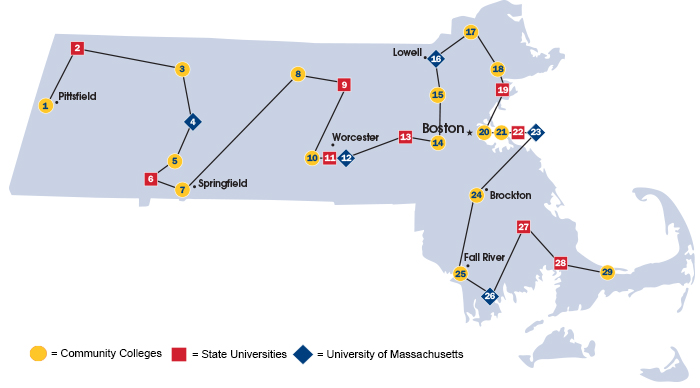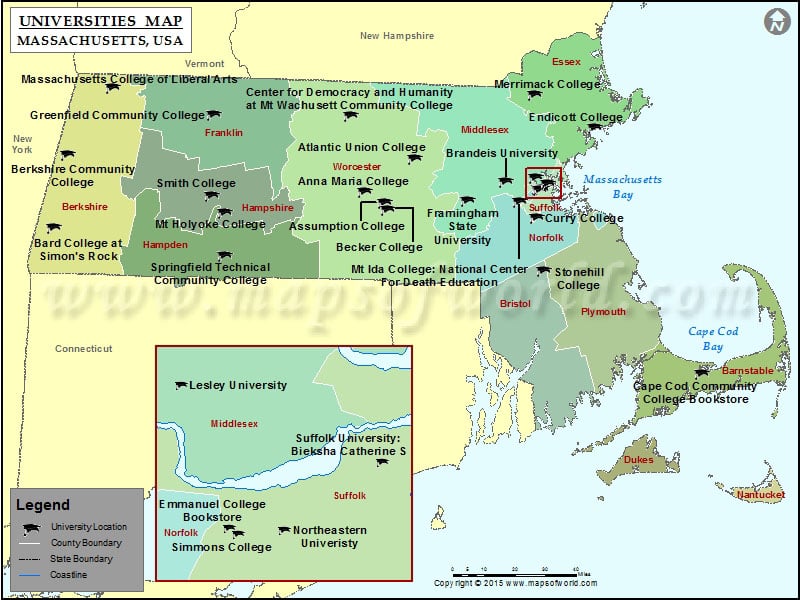Navigating the Landscape of Higher Education: A Comprehensive Guide to Massachusetts Colleges
Related Articles: Navigating the Landscape of Higher Education: A Comprehensive Guide to Massachusetts Colleges
Introduction
With enthusiasm, let’s navigate through the intriguing topic related to Navigating the Landscape of Higher Education: A Comprehensive Guide to Massachusetts Colleges. Let’s weave interesting information and offer fresh perspectives to the readers.
Table of Content
Navigating the Landscape of Higher Education: A Comprehensive Guide to Massachusetts Colleges

Massachusetts, renowned for its rich history and vibrant culture, is also home to a constellation of esteemed institutions of higher learning. From world-renowned universities to specialized colleges, the state offers a diverse array of educational opportunities. Understanding the landscape of these institutions can be crucial for prospective students, parents, and anyone seeking to explore the academic and cultural offerings of the Commonwealth.
A Visual Guide to Massachusetts Colleges
A visual representation of Massachusetts colleges, often presented in the form of a map, serves as an invaluable tool for navigating this complex landscape. These maps typically depict the location of various colleges and universities across the state, providing a geographically-based overview of the higher education landscape.
Benefits of Using a Map of Massachusetts Colleges
-
Visual Clarity: Maps offer a clear and intuitive representation of the physical distribution of colleges, allowing users to instantly grasp the geographical proximity of different institutions. This visual clarity can be particularly helpful when considering factors such as commuting distance, accessibility, and proximity to specific areas of interest.
-
Comprehensive Overview: A map of Massachusetts colleges typically encompasses a wide range of institutions, including public and private universities, liberal arts colleges, community colleges, and specialized schools. This comprehensive overview allows users to explore a diverse array of educational options and identify institutions that align with their academic and personal interests.
-
Exploring Regional Differences: Maps can highlight the distinct clusters of colleges in different regions of Massachusetts. For instance, the Boston area boasts a concentration of prestigious universities, while the western part of the state features several liberal arts colleges known for their strong academic programs and scenic campuses.
-
Discovering Hidden Gems: Maps can reveal lesser-known institutions that might not be readily apparent in traditional rankings or lists. These hidden gems often possess unique strengths and offer distinct educational experiences that might perfectly suit individual student needs.
Types of Information Found on Maps of Massachusetts Colleges
Maps of Massachusetts colleges typically incorporate various elements to provide a comprehensive understanding of the state’s higher education landscape. These elements may include:
-
Location: The precise geographical coordinates of each institution are essential for understanding their spatial distribution.
-
Institution Type: Maps often differentiate between universities, colleges, community colleges, and specialized schools, enabling users to filter their search based on their desired level of education.
-
Institution Size: The size of each institution, represented by markers or symbols, can offer insights into the scale of the student body and the overall campus environment.
-
Academic Focus: Some maps may indicate the primary academic areas of focus for each institution, such as engineering, liberal arts, business, or healthcare.
-
Campus Features: Certain maps may highlight specific campus features, such as libraries, athletic facilities, or student housing, providing a glimpse into the overall campus experience.
Exploring the Map: A Practical Guide
When using a map of Massachusetts colleges, it is essential to approach it strategically to maximize its utility. Here are some tips:
-
Define Your Search Criteria: Before embarking on your exploration, clearly define your academic goals, preferred location, and desired institution type. This will help you focus your search and identify institutions that align with your priorities.
-
Utilize Interactive Features: Many online maps offer interactive features, allowing users to zoom in, pan across the state, and click on individual institutions for detailed information. Take advantage of these features to explore specific areas of interest or delve deeper into the details of each institution.
-
Consider Campus Visits: While maps provide a valuable overview, they cannot fully capture the nuances of individual campuses. Consider scheduling campus visits to experience the atmosphere firsthand, interact with faculty and students, and get a sense of the overall environment.
-
Consult Additional Resources: Maps serve as a starting point for your research. Complement your exploration with additional resources such as college websites, rankings, and student reviews to gather comprehensive information about each institution.
FAQs About Maps of Massachusetts Colleges
Q: Where can I find a map of Massachusetts colleges?
A: Numerous online resources offer maps of Massachusetts colleges, including websites of higher education organizations, college search platforms, and state government websites.
Q: What types of maps are available?
A: Maps of Massachusetts colleges can be found in various formats, including static images, interactive online maps, and downloadable PDFs.
Q: What information is typically included on a map of Massachusetts colleges?
A: Maps typically include the location, type, size, and academic focus of each institution. Some maps may also include information about campus features, admission requirements, and tuition costs.
Q: How can I use a map to find the right college for me?
A: By defining your search criteria and utilizing the interactive features of online maps, you can narrow down your choices and identify institutions that meet your specific needs.
Q: Are there any limitations to using maps of Massachusetts colleges?
A: Maps provide a valuable overview but should not be considered a sole source of information. Consult additional resources to gather comprehensive details about each institution.
Conclusion
A map of Massachusetts colleges serves as a valuable tool for navigating the state’s diverse higher education landscape. By providing a visual representation of the location and characteristics of various institutions, maps offer a clear and comprehensive overview of the available options. Utilizing maps effectively requires a strategic approach, defining search criteria, exploring interactive features, and consulting additional resources. With careful consideration and exploration, maps can empower individuals to make informed decisions about their educational journeys and discover the perfect fit for their academic aspirations.








Closure
Thus, we hope this article has provided valuable insights into Navigating the Landscape of Higher Education: A Comprehensive Guide to Massachusetts Colleges. We hope you find this article informative and beneficial. See you in our next article!